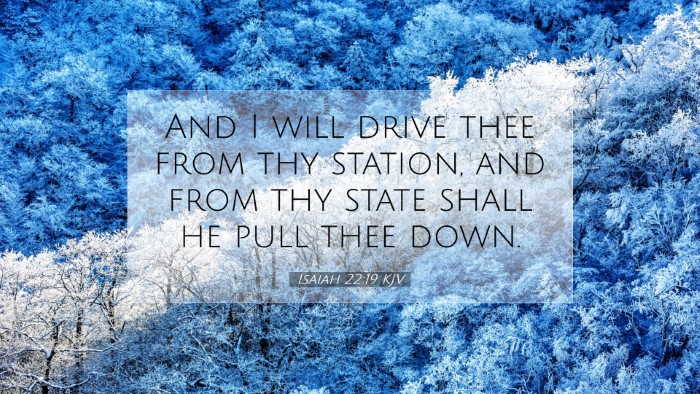Commentary on Isaiah 22:19
Isaiah 22:19 states:
"I will thrust thee from thy station, and from thy state shall he pull thee down."
Context and Overview
The context of Isaiah 22 encompasses a prophetic vision concerning the judgment of Jerusalem and its leaders during a critical time in Israel's history. This chapter reflects upon the failures of Judah's leaders, particularly in their neglect of spiritual responsibilities and reliance on worldly security.
The Thematic Essence of Isaiah 22:19
In this verse, we see a direct address from God regarding the consequences of unfaithfulness within leadership. The judgment articulated in this verse has both immediate and long-term implications not only for the individuals directly involved but also for the broader community.
Insights from Public Domain Commentaries
Matthew Henry's Commentary
Matthew Henry emphasizes that this verse is a declaration of God's authority in removing those who fail in their duties. He remarks:
"When men are unwilling to humble themselves under the hand of God, He will be sure to humble them by His hand."
Henry discusses how the proud and negligent will be stripped of their positions, highlighting that true leadership is not only a privilege but bears the weight of responsibility before God.
Albert Barnes' Notes on the Bible
Albert Barnes provides a detailed interpretation of the phrase "I will thrust thee from thy station." He explains:
"This implies a sudden and decisive action that signifies divine retribution against those who misuse their power."
Barnes correlates this judgment with a broader theme of divine justice that operates throughout scripture, noting that God does not allow corrupt practices to endure unchallenged. The fall of leaders serves as a cautionary tale, underscoring the need for humility and faithfulness to God's covenant.
Adam Clarke's Commentary
Adam Clarke comments on the socio-political implications of this judgment. He writes:
"The state of society, affected by the conduct of its leaders, bears a transformative role in the nation's spiritual wellbeing."
Clarke emphasizes that the unfaithful leaders are to be pulled down not merely as an act of punishment but as a necessary step towards restoration. By removing those who lead astray, God makes way for righteous leadership that can guide the people back to His ways.
Theological Implications
This verse carries significant theological weight, particularly around themes of leadership, accountability, and God's governance in human affairs. Theologically, it raises questions about:
- Divine Sovereignty: God's ability to intervene in human affairs emphasizes His ultimate authority as ruler over nations and individuals.
- Human Responsibility: It highlights the serious responsibility of leaders to act justly and righteously.
- Judgment and Restoration: The concept that leadership failure leads to divine judgment, while the removal of unfaithful leaders may pave the way for renewal and hope for the people.
Application for Pastors and Theological Students
For pastors and students of theology, Isaiah 22:19 serves as a poignant reminder of their role as shepherds. It encourages an examination of personal leadership practices and their alignment with God's directives:
- Examine Leadership Practices: Pastoral leaders should consistently evaluate their actions against God's standards to avoid the pitfalls of arrogance and negligence.
- Foster Accountability: Engaging in accountability with peers can help safeguard against moral failings and maintain a commitment to faithful leadership.
- Encourage Congregational Awareness: Educating the congregation on the seriousness of leadership choices can foster a community that supports righteous leaders and understands the stakes involved in spiritual governance.
Conclusion
Isaiah 22:19 calls attention to the profound responsibility of leaders within the faith community. As articulated by the noted commentators, it serves both as a warning and a promise of hope—warning those who fail to lead faithfully and promising that God’s providence will ultimately triumph, resulting in a community restored to righteous paths.


